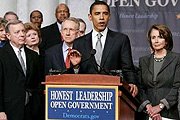"How should I respond to my seven-year-old daughter when she is terrified by the news and images of destruction in my country? The bombing of bridges we recently traveled upon, the demolition of our only airport, where my daughter was happily running around just a few weeks ago. What should I say to her when a house was destroyed and 11 people in it killed in one air strike? What should I say to her when a two-year-old child was literally cut in half in a vicious air strike?"
- Riad Kassis from West Bekaa, Lebanon in Christianity Today
"They say they're hitting Hezbollah, but they're hitting the people. They're hitting the children," said Hussein Yaacoub, who fled his border village of Houla on Saturday. He grabbed the shoulder of his 5-year-old son, Mohammed. "Is he Hezbollah?"
-"Residents of Besieged City Feel 'Just Left Here to Die'", Washington Post, Friday 21 July 2006
"The road returns to Tyre, where the city prepared to inter in a temporary grave 81 corpses collected from the villages of southern Lebanon. Once the fighting subsided and the roads were safe again, their families would bury them in their own towns. ...
"This is so inhuman," said Rabia Abu Khashb, 28, as he surveyed the coffins, 15 sized in half for children.
"God protect them," he said softly. "God awaits them." ...
Down the row were the coffins of two children from the same family: Qassem Mohammed Ghannam and Zeinab Mohammed Ghannam.
A women in black sobbed. "My sweetheart, yesterday you were playing with me. Who will I play with tomorrow?"
- Road Through a Landscape of Death, Washington Post, Sat 22 July
"During the 1930s, when the Spanish town of Guernica was bombed and the Japanese used similar tactics on Chinese cities, the world responded with moral outrage. In 1939, after the Nazi bombings of civilian populations, President Franklin D. Roosevelt declared that:
'The ruthless bombings form the air of civilians in unfortified centers of population...has profoundly shocked the conscience of humanity.... I am therefore addressing this urgent appeal to every government which may be engaged in hostilities publically to affirm its determination that its armed forces shall in no event, and in no circumstances, undertake the bombardment from the air of civilian populations or of unfortified cities.'
In 1940 Winston Churchill also denounced air bombardment of cities as 'a new and odious form of attack.'
The British Foreign Office stated:
'His Majesty's Government have made it clear that it is no part of their policy to bomb non-military objectives, no matter what the policy of ht German Government may be. In spite of the wanton and repeated attacks of the German Air Force on undefended towns in Poland, Norway, France, Holland, and Belgium, His Majesty's Government steadily adhere to this policy.'
Later in the same year in response to Luftwaffe attacks on British cities the Royal Air Force began to raid German industrial cities. In 1942 the British started a policy of ' obliteration bombing' intended to terrorize the German people and reduce their 'will to resist.' By 1943 the United States Air Force joined the English in obliteration bombing. On August 3, 1943 after Hamburg had been pounded by ten days of concentrated air raids, 60,000 acres of the city caught fire and turned in what was to be called a 'fire storm.' This meant that the entire city began to function as a huge furnace. those who had taken refuge in shelters were gradually roasted alive as the temperatures mounted, and others who tried to escape the inferno were carried back into its center by high winds. The effect at Hamburg was unintended, but the obliteration bombing of Dresden in 1945 was deliberately planned. The city was crowded with refugees and, despite later claims that it was the center of poison=gas production, in reality it was of slight military importance. Waves of British bombers laid a fire storm over eleven square miles of the city. Temperatures soared to 1000 degrees centigrade and hurricane-strength winds swept people and objects into the core of the city. The number o bodies was so enormous that it took weeks to dispose of them and estimates of the dead vary between one hundred thousand and a quarter of a million."
from Robert G. Clouse's War: Four Christian Views (featuring Herman A. Hoyt, Myron S. Augsburger, Arthur F. Holmes, and Harold OJ Brown), pp. 189-191 of Clouse's Postscript (emphases mine)
The recent quotes above are about the dead in Lebanon. I could easily find similar quotes about innocent dead in Israel.
I think that we in the church need to have a conversation that transcends Just War versus Pacifism.
That conversation needs to be about "collateral damage" or the seeming disregard of combatants from the injury and death of innocents during wartime. It seems to now be an accepted part of warfare, but Roosevelt and Churchill's comments above show that has not always been the case.
We need to decide what's right (I think I know) and then we need to use our voice.
- resources on the current Middle East conflict

























